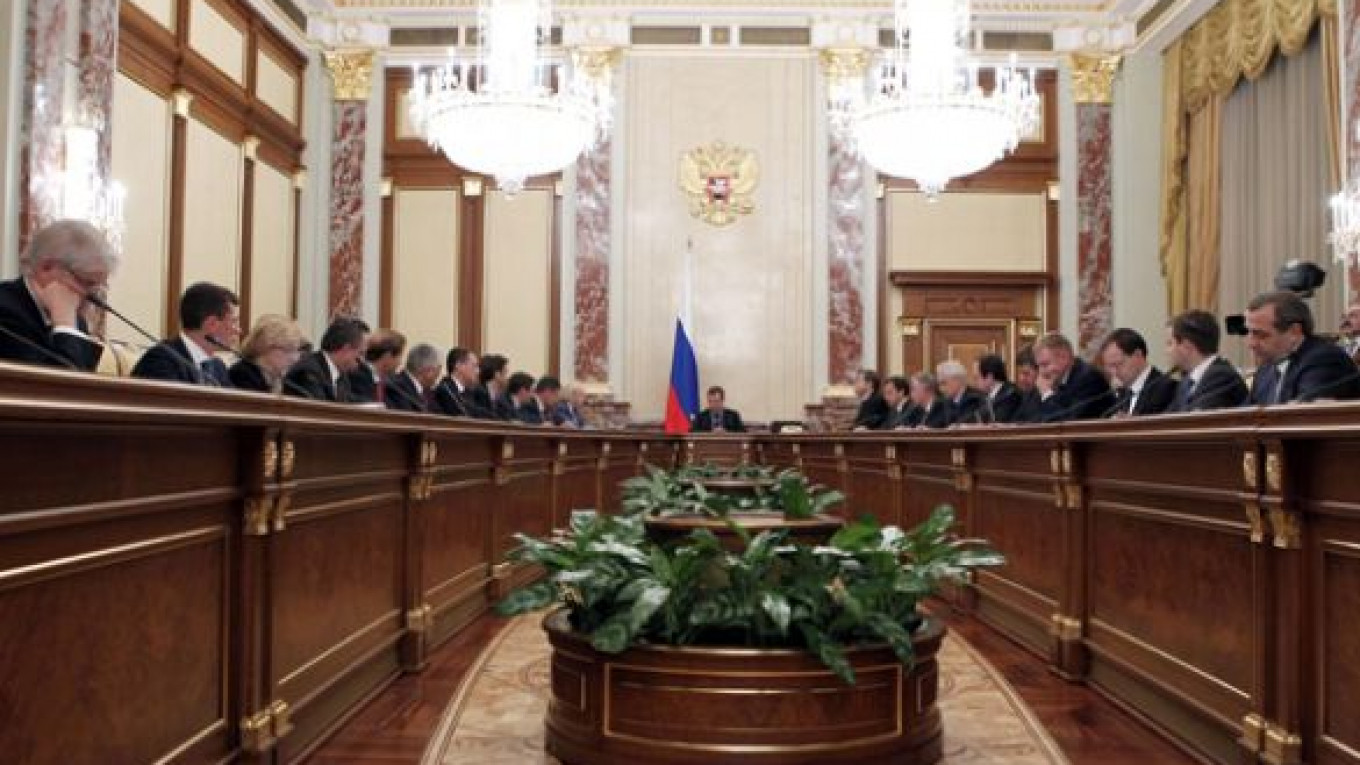Prime Minister Dmitry Medvedev on Thursday snapped back at President Vladimir Putin, who fired a broadside at next year's budget plan earlier this week.
Following through with his criticism, Putin on Wednesday formally reprimanded three ministers for failing to follow his orders when they made proposals for the budget.
Medvedev, who stepped down as president in May, defended his Cabinet's record.
"When I worked as president, I never liked [the budget] either," he said during a regular Cabinet session. "But I always remembered and realized how difficult it was to glue together a budget, especially in the conditions of a crisis or in a postcrisis or precrisis situation."
He described the work to put together a budget as a "set of self-restraints and compromises, each one worse than the other."
Nonetheless, Finance Minister Anton Siluanov on Thursday proposed ways of ameliorating the situation to meet Putin's orders.
He proposed that the government take almost all the dividends for this year that state company Rosneftegaz planned to keep. The measure would withdraw 95 percent of the total dividend payout, or 100 billion rubles.
Medvedev approved the move, which is likely to upset Rosneft chief and Rosneftegaz chairman Igor Sechin, who had pushed for using the money to snap up stakes in some energy companies during planned privatizations.
His idea is to make Rosneftegaz, which holds the state's stakes in Rosneft and some other energy companies and therefore collects dividends, a bigger player.
The Cabinet must have the budget ready for the State Duma by the end of the month.
Putin reprimanded Regional Development Minister Oleg Govorun, Labor and Social Development Minister Maxim Topilin and Education and Science Minister Dmitry Livanov.
Medvedev on Thursday described next year's federal budget as austere. Spending is set to increase to 13.4 trillion rubles, or 5.5 percent over this year's number. The deficit is projected to be 0.8 percent of gross domestic product.
"The budget is dictated by the real economic situation that developed in the country and the world," Medvedev said. "This situation is not amusing. It's difficult, and that's why the budget is tough and, in some places, quite challenging."
The government for the first time based expected revenues on the budget rule, or the average oil price in the previous five years, rather than a flimsy assumption of where oil will be at next year.
Underpinning the budget now is an oil price of $91 a barrel for Urals crude, the main Russian blend. However, the Economic Development Ministry believes the price will be a bit higher: $97.
State spending on infrastructure will grow "moderately," while salaries of budget-dependent employees, such as teachers and doctors, will increase at an "accelerated" pace, Medvedev said.
The government forecasts that inflation will not exceed 6 percent. The economy is expected to grow 3.5 percent.
On the hotly debated issue of changing the pension system, Medvedev said the government is inviting comment on its proposals, with an eye to making a final decision by the end of the year.
Economic Development Minister Andrei Belousov said at the meeting that net capital outflow amounted to $52 billion in the January-to-August period.
Related articles:
A Message from The Moscow Times:
Dear readers,
We are facing unprecedented challenges. Russia's Prosecutor General's Office has designated The Moscow Times as an "undesirable" organization, criminalizing our work and putting our staff at risk of prosecution. This follows our earlier unjust labeling as a "foreign agent."
These actions are direct attempts to silence independent journalism in Russia. The authorities claim our work "discredits the decisions of the Russian leadership." We see things differently: we strive to provide accurate, unbiased reporting on Russia.
We, the journalists of The Moscow Times, refuse to be silenced. But to continue our work, we need your help.
Your support, no matter how small, makes a world of difference. If you can, please support us monthly starting from just $2. It's quick to set up, and every contribution makes a significant impact.
By supporting The Moscow Times, you're defending open, independent journalism in the face of repression. Thank you for standing with us.
Remind me later.






